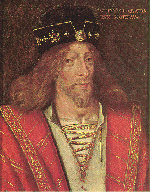


Copyright (c) 1998
Royal Stuarts
All Rights Reserved
Royal Stuarts
All Rights Reserved
|
Battle of Harlaw, 1411
from
|
 |
In the summer of 1411 the agriculturists and burghers of the North were appalled by a rumour that a body of marauding Highlanders of unparalleled force - on the scale, indeed, of a considerable army-was coming upon them to pillage and burn, and conquer Scotland to the Tay. The force was reputed to amount to ten thousand. That might not seem overwhelming to a country which had dealt with the great English invasions, but it was the districts exempt from these that were threatened, and the invasion was, in fact, an attack in the rear. It took the country b y surprise, an d there was a hasty gathering of the gentry, with their tenants, and the burgher force of the towns. They could muster a small body only, but it was a high-spirited, efficient force, well armed. It was commanded by the Earl of Mar, whom we have lately found in different company. He had gained experience in the French wars, and several of his followers possessed the same advantage.
Donald and his host came through the northern mountains to Benochie, near the Don, in Aberdeenshire. This hill is a sort of bastion of the Grampians abutting into the Lowlands. From its top one can see, towards the west, mountain after mountain rolling away upwards to the highest of the Grampians; on the other side spreads to the coast a plain as flat as Lincolnshire. Donald kept on the shoulder of this outstretching hill till he descended on the flat country, as if reluctant to leave the rough mountain ground to which his followers were accustomed. At Harlaw, on the flat moor edging up to the rise of the hill, he met those who had come to guard the entrance to the low country. The usual rush of the Highlanders was met by a compact body of men-at-arms and spearmen, who held their own firmly. The numbers of the Highlanders, however, enabled them, wasteful as they were of life, to dash, wave after wave as it were, against the compact little body; and the chances were, that by giving several lives for each one, the Highlanders might annihilate their opponents. These held out, however, and Donald had to retreat; there was no great victory gained over him, but he was stopped in his career, and that was everything.
So, on the 24th of July in the year 1411, ended one of Scotland's most memorable battles. On the face of ordinary history it looks like an affair of civil war. But this expression is properly used towards those who have common interests and sympathies, who should naturally be friends and may be friends again, but for a time are, from incidental causes of dispute and quarrel, made enemies. The contest between the Lowlanders and Donald's host was none of this; it was a contest between foes, of whom their contemporaries would have said that their ever being in harmony with each other, or having a feeling of common interests and common nationality, was not within the range of rational expectations.








